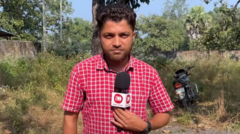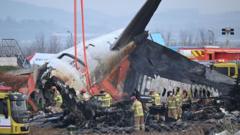Mukesh Chandrakar, a journalist known for exposing corruption, was found dead in Chhattisgarh, sparking protests and demands for a thorough investigation into his murder.
Journalist Found Dead in Chhattisgarh: A Call for Justice

Journalist Found Dead in Chhattisgarh: A Call for Justice
The discovery of Mukesh Chandrakar's body in a septic tank raises questions about journalist safety in India.
In a tragic incident that underscores the dangers faced by journalists in India, the body of Mukesh Chandrakar, a 32-year-old freelance journalist, was discovered in a septic tank in the Bijapur district of Chhattisgarh. Chandrakar, who reported extensively on alleged corruption in public construction projects, had been missing since New Year's Day, prompting his family to file a police complaint.
The search for Chandrakar escalated after authorities tracked his mobile phone, leading to the grim discovery of his remains on Friday in a septic tank situated within the compound of a road construction contractor. The police initially inspected the compound on January 2 but found nothing; a more thorough search on January 3 unearthed the journalist's body, concealed beneath concrete slabs. Preliminary examinations indicated severe injuries consistent with blunt-force trauma.
In connection with his death, three individuals have been arrested, including two relatives. Among those apprehended is a cousin of the slain journalist, while Suresh Chandrakar, the owner of the compound and another relative, remains at large. Local journalists have organized protests demanding justice and stricter measures against those involved.
The Press Council of India has urged local authorities for a comprehensive report on the incident, with the state's chief minister describing the death as "heartbreaking" and announcing the formation of a special investigation team. This case highlights the ongoing risk faced by journalists in India, where many have been targeted for their reporting on corruption and environmental issues. According to Reporters Without Borders, India is one of the most perilous places for media professionals, averaging three to four journalist killings each year related to their work.
In a similar vein of violence, another journalist, Subhash Kumar Mahto, was shot dead in May 2022 for covering illegal sand mining activities. The repeated attacks on journalists serve as a stark reminder of the precarious environment for those who dare to speak out in the name of truth and transparency.



















